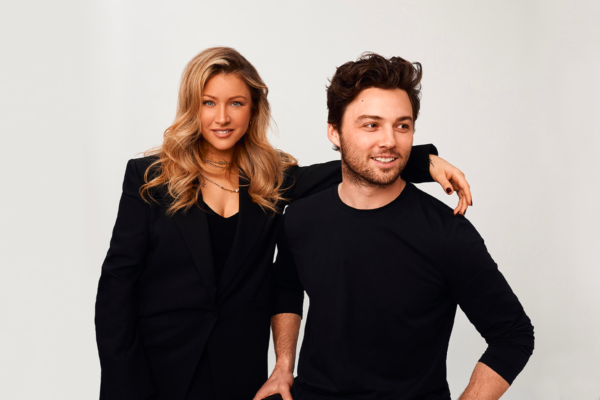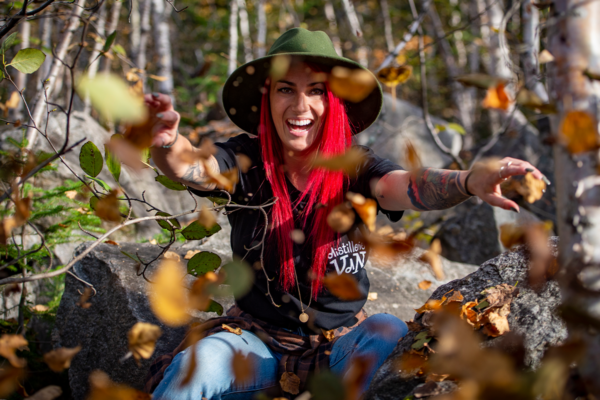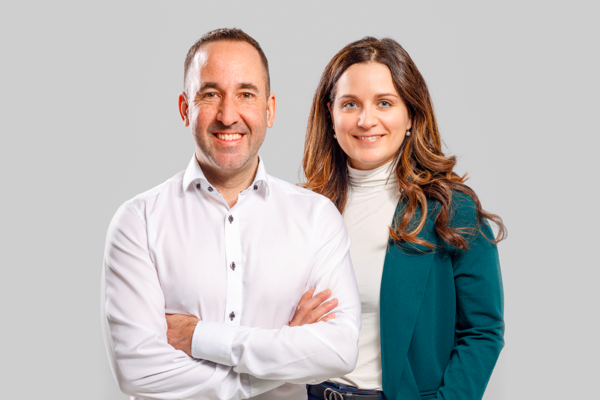Joelle Desaulniers says that she started her business “in a cobwebby basement.”
But today JOELLE Collection, her women’s clothing boutique, is a runaway success. In fact, she hired 40 employees over the past year alone!
Born in Trois-Rivières, Joelle has carved out a special niche for herself in the fashion world, giving the lie those who think that world can exist only in the big cities.
After 5 years of doing fashion design for private customers, Joelle and her partner Billy Lacasse decided to create their own universe for “unpretentious fashion.”
“There’s something pretentious about saying you’re cutting edge: You know what’s coming. The clothes you see on runways , might look great in a museum, but who really wants to wear them? I want to offer something that’s accessible for everyone. No pretensions – that’s me. And that’s what you get in my business.”
Through her women’s apparel collections, Joelle wants to do away with labels that box women in: “mother,” “career woman” or “she’s too much this or not enough that.”
Joelle believes these labels prevent women from expressing who they really are in all their diversity and in all lthe facets of their lives.
“Fashion is exciting. But it’s so removed from our real lives that it makes us feel boxed in and stuck in the forms it imposes on us. Fashion is about freedom. It’s an extension of our personality.”

How can a piece of fabric have such a big impact?
Many women feel self-conscious about their bodies, even if they don’t always talk about it. “Too small,” “too big,” “too fat.” How women feel about their bodies is influenced by a lot of things. Fashion is one of them.
If fashion can negatively affect women’s perception of themselves and their bodies, it can also have a positive effect, provided it’s done intelligently and ethically.
“Fashion may seem superficial at first, but it has the ability to create profound change. I think it’s great to see women step out of their comfort zone. They become more confident and that has a major impact on their lives.”
Joelle knows clothes have the power to improve our relationship with our body, our self-confidence and even our interpersonal relationships. She sees it first-hand with her customers.
A woman who looks in the mirror and thinks she’s beautiful for the first time.
A woman who has survived cancer and is revamping her wardrobe for her new life.
Women coming out of dressing rooms and complimenting each other.
“There are no mirrors in our dressing rooms for a reason. Because if you’re locked inside your dressing room, you may be locked inside your thoughts as well. We invite women to come out of the dressing room into a space designed to protect their privacy. They walk out of their dressing rooms and encourage each other: ‘Oh, wow! That looks fabulous on you! ’ We’ve created a community of women who support each other rather than living in isolation.”
For Joelle, fashion doesn’t just influence us. It’s also a reflection of our society.
The examples she gives to highlight women’s place in society are the camouflage pattern, which comes back into fashion during wartime, the “jogger suit” trend (a jogging version of the professional look), which emerged during the pandemic, and loose-fitting clothing for women.
“Right now women are at the centre of many issues, and we want to create more space for them. In fact, fashion is doing just that with the oversize trend. Meanwhile men’s fashion is tending toward skinny with more fitted cuts, closer to the body.”
These are the types of trends that fascinate Joelle and inspire her as creative director to design her collections. However, she admits that the world of fashion is not always rosy and that many less than ethical practices persist in the garment industry.

Ethical fashion
Poor working conditions, lack of transparency, use of polluting products. The textile industry has been getting a lot of bad press lately.
Joelle decided to make professional ethics her signature issue by making her customers aware of the conditions in which her clothes are produced.
“When it comes to saving money and fast fashion, people bury their heads in the sand about the real cost of a product. If you don’t want to spend a lot of money, someone else somewhere in the world is paying the price.”
Joelle has various strategies to ensure that her clothing is high-quality and ethically produced – while keeping the price affordable.
She and her team visit the manufacturing plants she uses. She also works with independent third parties who carry out quality control based on criteria that she determines in advance: good working conditions, decent wages, well-lit manufacturing premises, etc.
Joelle even goes so far as to publicly show the places where her clothes are produced, something few companies in the fashion industry dare to do.
“For me, impact entrepreneurship means educating. Everything comes down to that. When we understand things, we’re more open to change.”

In addition to carefully choosing her manufacturing sites, Joelle also takes the time to select each product and each fibre used to produce her clothing. “Eco-responsibility includes product quality. The product has to last a long time.” For her jeans collection, she reduced the number of chemicals from seven to three.
Asked about the main challenge for impact entrepreneurs like her, Joelle’s answer was “stick to your values” and “remember why you started your business in the first place.” Especially in a growth environment.
“With growth, the challenge is to communicate your values effectively when you delegate. How you convey the message, how you address your customers, etc. (…) We’ll never sell out or sell under pressure. If a customer has doubts or a garment doesn’t work, we’ll talk about it. There’s a way to do it. That’s the first thing we say in our training sessions.”
If your heart is telling you to update your wardrobe with clothes that not only look good but do good, take a look at the latest JOELLE collection.
And ask her team for advice. They’ll tell you what they think.
Honestly.
• • • • • • • • • • •
Thanks to the commitment of valued partners: Économie Québec, through its agent Investissement Québec, National Bank, the Business Development Bank of Canada (BDC), the Fonds de solidarité FTQ, and Fondaction, Evol has a large envelope to grant conventional loans to support businesses with inclusive, diversified ownership that have a positive social and environmental impact aligned with the UN’s Sustainable Development Goals (SDG).






